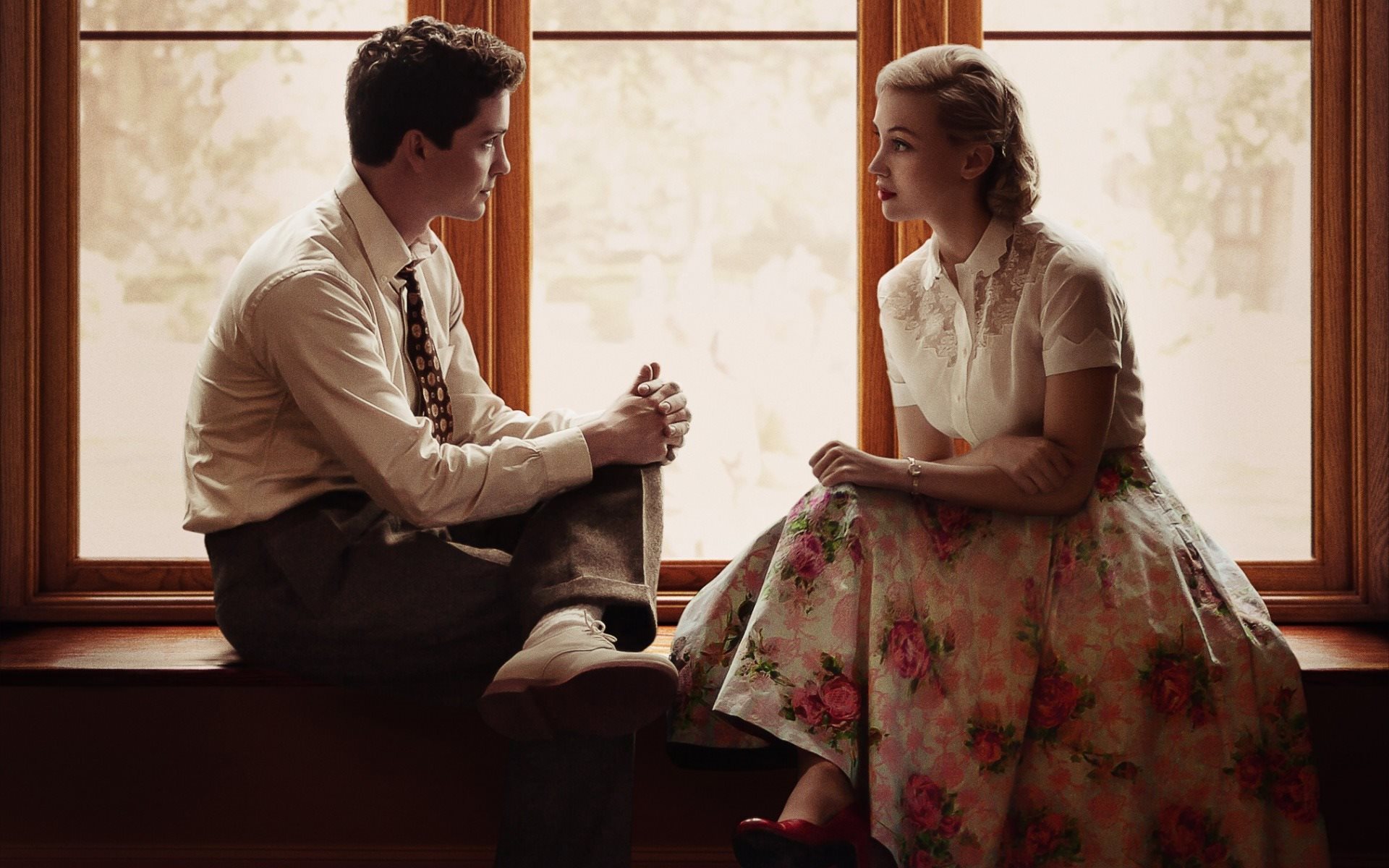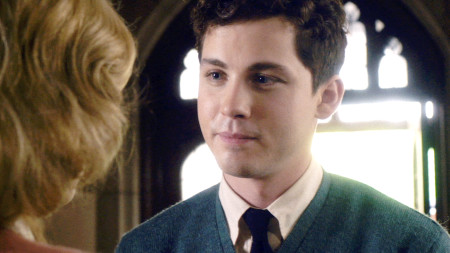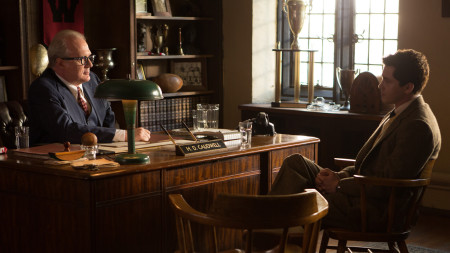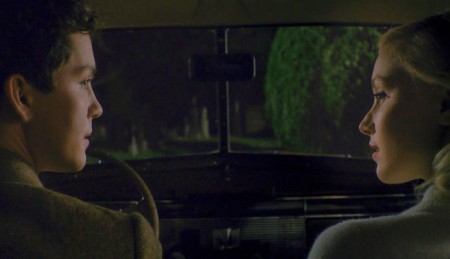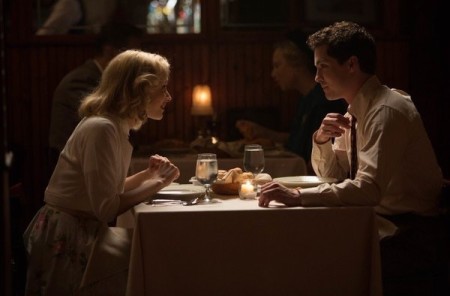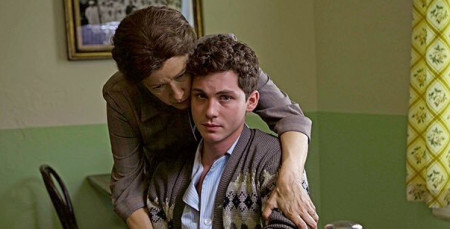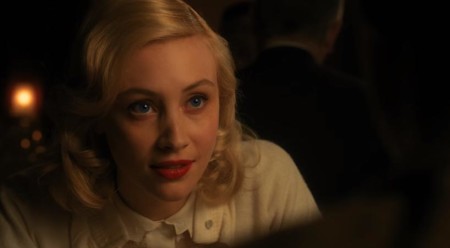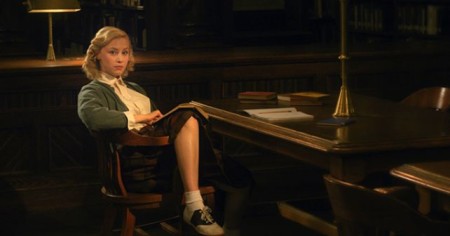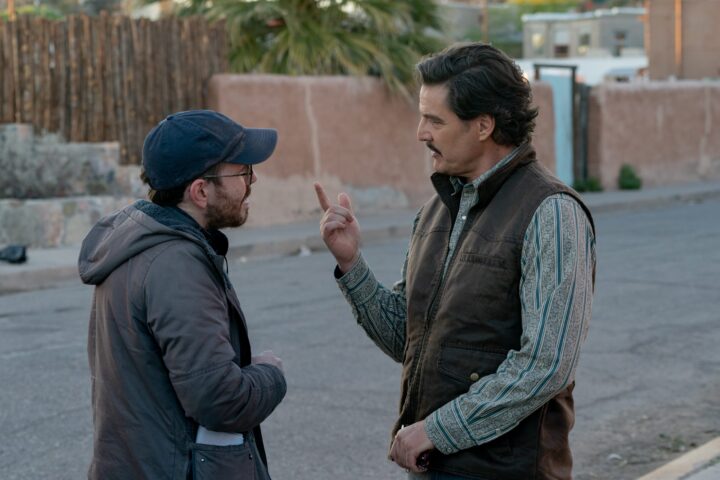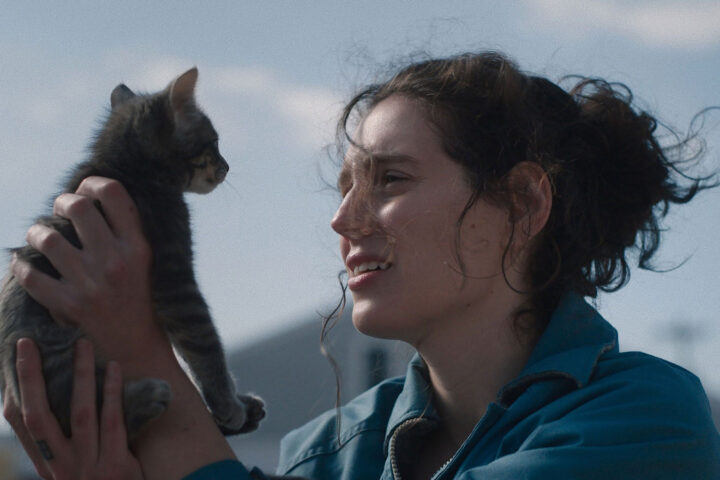Young stars Logan Lerman and Sarah Gadon create a palpable, doomed love in James Schamus’ superb screen adaptation of Philip Roth’s 2008 novel Indignation, and when I sat down with them recently in a bustling Chicago restaurant, they pretty much put me into the same g-force freefall we feel for them in the film.
We spent about an hour catching up before meeting a packed screening audience for a discussion their new film, and their sweetness and candor gave me serious butterflies. Yeah, yeah, we are supposed to be objective in this business, but damned if their unintentional, natural charm offensive didn’t work me over. Warm, funny, transparent and ever-tolerant of my inquisition on their individual processes and chemistry, the pair offered sharp insights into their onscreen partnership as well as individual approaches to building their careers as two of the best young actors working today.
I’ve met Lerman a couple times since his big move break in 2010’s Percy Jackson and the Olympians. A preternaturally sensitive young actor, his last two performances, as a withdrawn teen in 2012’s The Perks of Being a Wallflower and a wet-behind-the-ears recruit in 2014’s fog of World War II picture Fury, cemented his status as the go-to guy when you need to chart the spoils of innocence lost.
Set in 1951, Indignation is the first directorial effort by indie pillar Schamus, former CEO of Focus Features and founder of Good Machine, here adapting Philip Roth’s fatalistic look at young lives and loves at home thwarted against a backdrop Korean War, which Jewish New Jersey teen Marcus Messner (Lerman) avoids by settling into a Christian, Midwest college.
None of this sits well with atheist Marcus, who flatly rejects the school’s social and religious doctrines while courting damaged beauty Olivia (Gadon), sparring with the spry university dean (Tracy Letts) and trying to uphold his commitments to his increasingly depressed mother (Linda Emond) back east.
In Indignation, Lerman may be a playing a college freshman, but any adolescent allusions are quickly dispelled by the ever-present threat of war and by a love for what initially seems like the perfect girl. Played by Gadon with a startling combination of 50s-era, conservative Midwestern glamour masking, we gradually learn, some vey deep wounds, the actress is a revelation, scene-for-scene as confident as Lerman is off-balance, their frank courtship informed by her sexually liberated co-ed’s directness. Of course, this masks a darkness Marcus can’t possibly understand. And then the consequences of indignation, or perhaps maybe fate, intervene in the cruelest of fashions.
Indignation is purely an actors’ movie; it does not depend on plot and is all about the writing and performances. Today, that makes it somewhat of an anomaly.
Logan Lerman: They’re hard to get financed.
Sarah Gadon: You always want to talk business.
LL: That’s the reason why, though! It’s hard to get a film financed nowadays. More than anything, you need to satisfy the business end of it in order to get in financed. Somebody is investing their money and they want to make money off whatever you’re doing.
I suppose it has always been that way, but now more than ever it prevents movies from being made.
LL: It’s sad.
SG: There is also art, if you believe in cinema as an art form. I hardly believe that James Schamus got into filmmaking to make a buck.
LL: I mean, it was a part of the decision I’m sure. You’d have to be profitable for Focus and all those things. It is the balance between being able to get your film made and make it good. This is a unique film—as you were saying—and it’s not gimmicks. You are not coming for any other reason than the strength of the writing and hoping to be entertained by interesting conversation.
I understand James put you both through a period of immersion into what it meant to be a teenager in 1951, including curriculums from schools and volumes of other research.
SG: Yes. James, being a professor also, is very willing to give you a curriculum as kind of a map for the film. We are pretty thirsty actors and we love research. So we were willing to lap up anything he was going to throw our way.
LL: James gave me the script in late December, 2014, and I immediately fell in love with it. He also gave me a ton of reading and worked on it for about six months until we started production. In those six months, we had countless hours of discussion and endless talks about whom Marcus was, why he was making his decisions, Phillip Roth’s background, my understanding the references my character is referring to in a lot of his debates. We spent a lot of time together and had that luxury, which is not too common. But we had about six months to dive in and figure it out. He was incredible partner to have.
Logan, you have a very particular sensitivity in each of your movies. In The Perks of Being a Wallflower, Fury and Indignation, you have this open vulnerability. It is extremely rare in young actors today who are more about confident posturing. It is a way of conveying deep emotion without words. You almost always make me cry.
LL: Thank you! You’re definitely making me feel good. And uncomfortable! (laughter) I don’t know. I really don’t know. I think it’s- I just work hard on the films and try to find- it sounds so pretentious and whatnot, but I just try to find truth in the material and understand the character’s plight, and I give as much as I can of myself to my job. I don’t know. I’m an emotional person.
Are you?
LL: I guess, so, yeah. I think so.
It’s a listening thing also, I think. A lot of actors don’t play the space between the dialogue. They are focused on what they are saying. You play the silences. You are fully engaged.
LL: Thank you. I’m just listening. That’s all. I am just there and working at being present. There are two types of actors, including those who are really dialed in and learning a scene like it’s a piece of music with specific notes, and they learn those notes and how to play them very well, and that’s all they do. And maybe the moments in between lines kind of become insincere. But I think as long as you’re an actor who is present and listening, then maybe that’s what it is. I don’t know!
SG: I know what it is. I think he really embodies, and becomes, his characters.
LL: I think maybe it’s that I don’t really care to embarrass myself and I don’t care if I look good in a movie, but I just want to respect the material. Maybe comparing to other actors in the way that you just described, they are may be more interested in trying to look good in a frame rather than find the truth of the situation.
SG: It’s so weird because I thought you were posing so often… (laughter)
LS: I don’t know, but thank you. It’s a total compliment. Thank you so much.
Sarah, you have a real confidence in this movie. Your voice is strong; articulation is precise and delivered with intention. Your voice sounds in a lower register than it does right now. It’s a very deliberate and unique delivery of the dialogue.
SG: Yeah, I definitely think there is something where women go into a little girl voice, and I usually don’t play those kinds of characters.
Olivia is very challenging and direct.
SG: That’s what I love about Olivia, and also what I love about her in the book. She tries to be so rational in her approach to these irrational situations, whether it is intimacy or even just how she cannot understand why her feelings are not landing on Marcus as cleanly as they should be. Instead of hiding from those moments, she goes straight to them. That’s the beautiful dynamic between them. It’s kind of like your first love, in that you sometimes are so earnest about it and you miss the mark a bit. I tried to bring that to her.
She certainly is bold in a number of ways and eye opening for 1951. I’d like to hear some of your thoughts on the construction of such an unpredictable young woman.
SG: Sure. James felt that Sylvia Plath was a real cornerstone for Phillip Roth when he was writing Indignation, so that was a wonderful way into the role for me, to re-immerse myself in a lot of her writing and poetry. I re-read The Bell Jar. What I really loved were her journals, and where I was kind of able to glean the most experience about the everyday college student in the 50s was really from her journals and her interior monologues. I found a lot of that very useful. There were small things that I didn’t even realize, like that on the weekends girls could not even go off campus unless they were with a date or signed out by a family member. So they really just were dying to get a date so they wouldn’t be that girl left on campus. I’m not saying that is why she originally goes out with Marcus, but…I think for a woman like Olivia it is just so tragic and sad. If she existed today, it would have been a different outcome for her. And the same for Sylvia Plath.
Logan, what was your best day on the set?
LL: The best day would have to be defined as the most fulfilling one, not necessarily the happiest moment of the shoot for me. After doing the scene with Tracy Letts in the dean’s office, I was fulfilled. I was fulfilled with completing a creative challenge that seemed kind of impossible.
How many pages was that scene?
LL: I don’t know, exactly. But I can tell you that several times I thought I would have to drop out of the movie because I could never get that scene. Several times over the course of working on it, I felt I was never going to be able to do it and was just going to end up making a fool of myself onset. So it was a matter of getting to the point where I felt like I understood all of the references in the scene and getting comfortable playing them with Tracy in that moment. I had a lot of time with the script and talking about that scene in particular. I was really learning the passages and positions that both characters had in that battle. Yet while we talked about it, we never really rehearsed it. I think I ran through it once with James and Sarah, where Sarah read Tracy’s part. It was really awkward. I feel like when we make discoveries in those rehearsal moments, I can’t recreate them. The day before filming, Tracy, James and I had a meeting and we talked about…food. I don’t know what the heck we talked about, but nothing about the scene; just getting to know each other. Then we showed up for work the next day to go to battle, and trusted each other that we had put the time into learning the material well so that we could explore that moment. There was never a time where we blanked. We would attempt to run through the whole scene each take. I drank a lot of caffeine and tried to stay focused on that challenging day. At the end of that day I felt relieved!
It was just one day of shooting?
LL: One day, yes. And we wouldn’t really break it up. We would do twenty-minute takes each time, except for the ending where we walked to- when I leave, that was the breaking point.
And the second scene between you was also shot on that single day?
LL: No, that was the next day. We gave ourselves a day to shoot that scene and we did it in ten hours, which is very James Schamus, because he did not want to overwork the crew and he wanted to have a livable schedule where you could maintain your personal life or whatnot, which is not something that a lot of directors really care about when making their film. They are just trying to put everything into it. James was like, ‘No, we can do one or two takes, get through the day and just live our lives.”
Did you feel like you wanted more?
LL: Yes, many times. I think that was a constant thing where we kind of had only a few gos a lot of the time. James was like, ‘No, it’s good. We got it.’
It is a bit of a mini-movie unto itself, and it seemed to me like the significance of the title came into focus.
LL: Yeah, I mean that is the powder keg exploding. I think he was filled with indignation since the beginning of the film. He feels like everyone is trying to control him.
Let’s talk about your chemistry in the film. It really works, and we get caught up with both of you. How do you manufacture that, or can you, even? Or does it just strike in the moment?
SG: I think chemistry is based on how much you open up to the person you are working with and how honest you are about yourself, and however long you have together. Pre-production is different for different films, but as long as you take the time to get to know each other and break the barriers you have with a stranger then I think you can create chemistry there. I think it’s evident where there are two strangers together in a moment where you are supposed to be falling in love or connected. You can see that.
LL: I think with any good scene partner it is about finding that. You can’t fake that. I mean, I can’t imagine just walking on the set and not knowing you and doing the scene.
SG: Well, it is interesting when you work with other actors because everyone sort of needs something different in your collaboration. Logan and I had a little bit of time in New York to get to know each other, and we did. We went to dinner and to the theater a few times, didn’t we?
LL: Yes, we did.
SG: We talked a lot about the material and also very much talking with James. I think we did the work, I guess, that you need to do to get to know somebody so that you can feel comfortable enough to be vulnerable with them and to trust them.
LL: And I think we are comfortable with the idea of it in the first place. Funny enough, I am remembering how James was the most uncomfortable with our intimacy.
SG: Yes, he was like a dad!
LL: So discussing it with him, he would blush about a scene of intimacy with us.
SG: There is so much to Marcus and Olivia and their connection to each other. It’s funny, because when I watched the film for the first time with an audience at Sundance and the scenes that are more explicit came up, I was completely horrified to be watching it with a bunch of people. While we were working on it, it never occurred to me that it could be an embarrassing thing.
Speaking of intimate scenes, do you negotiate those ahead of time and determine how exposed you are going to be, or how the dynamic will unfold?
LL: I don’t recall. Did we ever have a conversation?
SG: We spent a lot of time together and got to know each other and I think that is onscreen. I think that it is so wonderful when you meet an actor that is really willing to be open, and then you give yourself to the project. I think we both wanted to do that and the material called for it.
The movie deals with sexuality in a somewhat eye-opening way given that the time in American history, 1951, was after World War II yet before the sexual revolution and the explosion of teen culture; a very specific time and Midwestern place. Olivia, especially, knows what she is doing.
SG: I think if you read the novel you are just in his consciousness, and it’s something that James was very delicate about transposing into the film—that idea of getting into somebody’s perspective. The way that he plays with changing perspective in the film is different than the novel, and I like that he did that as a filmmaker. But that is what is so beautiful and honest about the film is that their interactions are just beautiful and real. There is nothing kind of cliché about the way that they interact. Right? (laughs)
LL: Yeah. It’s all in the writing. Those scenes and how they are structured and the way we communicate are rare to find in screenplays. I read a lot of scripts and don’t find characters as bold as these people are.
Indignation has cause, effect and fate hanging over it like a dark cloud. It is more poignant in that Marcus and Olivia should be at the most optimistic moment of their lives.
LL: There is a danger looming over all of his actions and potential decisions, and he does not want to get drafted and be sent to war, and that influences everything he does.
SG: Yes, it’s the two of them representing the bright future for America, yet they were very much on the fringe. He could not assimilate and compromise and it proved to be fatal for both of them. And I think the war proved to be this omnipresent thing. I think this is why James was driven to the story—because it is these two young people at the center of this very tragic narrative. And for us it was really this amazing, collaborative journey that we all went on together, which is so lovely when you are making a film. I think that made it really special.
LL: It was really special.
Logan, you have a knockout scene near the end of the film with Linda Emond, who plays your mother. She is also tragic, though in her own way. We understand both characters and it presents a quagmire. How was it acting with her in that moment?
LL: She is killer. I was blown away by her. Every moment working with her I was in awe of her work ethic and ability to just snap into it.
SG: Were you scared of her when you first met her? (laughs)
LL: Very! I was intimidated! She is super intimidating. This goes back to James and his taste in human beings and actors. He works with very deeply felt and intelligent actors, and meeting Linda and working with her and Sarah as well- Tracy I didn’t get to work with as much, but when working with Linda or Sarah I was constantly amazed at their approaches to their work and it made me want to work harder. Maybe is a mutual thing, but I think our creative juices get inspired by each other and we work off each other’s ideas. It is really fascinating to sit in a room and see how other people approach, explore and fully realize their characters. Working with her and hearing her process, and then being in that scene, makes you better at your job.
SG: She is so deeply in her actions that you can hear her thinking. It is amazing and terrifying at the same time!
LL: She also, in a very theater-trained way, very in tune with her voice and her performance. She knows her abilities well. They are very much there, on demand.
SG: Yes, all of her tools are ready.
LL: It’s really incredible. It keeps you on your toes. You want to keep up with her. She is very commanding.
Sarah, what’s the best part about your job?
LL: Yeah, what is it?
SG: The people that you meet and get to work with. It is about that collaboration. I just love working with great actors. I’m just able to- when I look at my friends and family and people I know, I feel fortunate to be able to work at something I really am passionate about, to go to work every day and love movies and make films; that I am able to take part in the process. Acting in them is something I really appreciate and enjoy.
Logan, this is being called a breakout role for you, which sounds like a cliché, but I think what is meant is that it is a graduation to a more adult role; that you have come into your own as a leading man now and really turned a corner. What do you think all that means?
LL: I don’t know. That’s very nice though! I don’t even know what to say. I don’t know what to say. I’m blushing. I don’t know how to say it, but thank you for that. Whatever they mean by that it sounds like a complement and I’ll take it and it. That validates the work we put in. I just want to find material as strong as this in the near future and continue working.
As a young star, how do you map out a career? I’ve heard that careers are made more on what you turn down than what you take. I imagine you can both easily work all the time if you want to. How do these choices factor into career longevity? How do you know what the right thing is?
LL: Yeah. I don’t know that. I don’t know when I’m doing the right thing. But yes, it’s a very- I go through ups and downs in terms of my decision-making. I think sometimes at the end of the day I want to make movies that I like and be a part of it. At the same time, I am very aware of the balance of being able to make the films I want to make and trying to balance whatever it is that allows me to be a part of something I want to do, you know? And it’s really stressful. It’s hard to find good material.
Sarah, you are building a diverse career. On the one hand, you have an impressive number of independent, artistically risky movies under your belt. But you also have Dracula: Untold.
SG: All over the map!
Is doing a film like that a strategic career move because it can put you over the top commercially?
SG: The honest answer was that I shot a film in the fall and then I didn’t work for six months. And I was like, ‘How am I going to pay my rent?’ So that came and I did it. It was a great experience because I had been surfing in the indie world and had not done a studio film. And I could not believe the resources! I was blown away by it. I ended up having a great experience. I met Luke Evans whom I adore and love. He is a wonderful actor. It was a different experience.
You’ve worked with David Cronenberg three times.
SG: Yes, three times! I love working with directors more than once. That is what I love.
I’d love to hear your thoughts on A Dangerous Method.
SG: It was terrifying. I booked it from tape, and I did not meet David until I went to German to shoot. It was the first major thing I had done, but I remember that Michael Fassbender was incredible and I learned a lot.
How do you describe Cronenberg?
SG: A true artist. He makes films the way he wants to and in an uncompromising way; so few people do that, as we were talking about earlier. He does not follow anything, and that is why I always love his films.
Do you guys thoroughly research the directors’ works prior to showing up to work with them?
SG: Oh yeah.
So when you go to the set, you can say ‘David, I saw this film you made…’
SG: Yeah, I like to work with him and quiz him about his movies. No, I don’t do that!
LL: I can’t even imagine that. It would be so cool to work with Cronenberg!
SG: I think that we both love films and watch a lot of them.
LL: I pick James Schamus’ brain all the time on memories of making the classics he has been a part of and try to learn from his experiences.
SG: He has so many and he’s a great storyteller. He always has these great tidbits. I was talking to him recently and he was giving me this advice: ‘Gadon, you have got to stop chasing around all of these directors. You need to chase roles!’
LL: He told me that too—same thing.
SG: Yeah, he is this wonderful mentor and you would be hard pressed to find people working in the industry who don’t have a James Schamus story and that is the incredible thing about working with him in a different way than others have experienced him.
What about you, Logan? You certainly have done a franchise series in Percy Jackson, but do you feel that pressure to be in larger, commercial things that are financially viable while having smaller things in your portfolio? Is that a concern, to be commercially bankable?
LL: Yes, I do worry and consider that. A lot. Especially in the offseason while I am trying to find projects. But I won’t compromise my creative integrity. It has to be something good. I love making independent films. It’s a different process; a truly singular vision most of the time. With bigger films there is more money on the line. But I do think of that very often. You find yourself thinking, ‘I need to do something that will be bigger and people will see it in order to make independent films and be valuable in a financier’s eyes.’ It’s a balance and you can’t predict when a good, bigger film will pop up. But I won’t compromise my integrity just because it is a bigger movie.
You took a year off between Fury and Indignation. Was that just a period of waiting for the right thing?
LL: Yes I did. And yeah, no. I had a few things that I was a part of that I was really stupid to drop out of. I just didn’t want to work. I was really just beaten up after doing (Fury) and I needed some time off to grow as a person, so I traveled and took some time to myself and I regret that decision now. One of the films I was working on turned out to be really good, but I can’t mention it because it would be rude to the people involved.
Sarah, you knew very early that you wanted to be a dancer. Acting came after.
SG: I went to the National Ballet school of Canada when I was young and the first time I stepped onstage I said, ‘I want to be a performer; one hundred percent. I love this. ’ Then I went to a performing arts school and learned all of the different disciplines. When I was in grade 5 I joined the school’s film club and we had this amazing teacher, Mr. Como, who showed us all of these great films that you ordinarily would never show a group of eleven or twelve-year-old kids. Like Harold and Maude! And I fell in love with filmmaking. I studied it in school, and that’s when I fell in love. Then I got to work with David. The rest was history.
Logan, you were strongly influenced by Eternal Sunshine of the Spotless Mind. But you also grew up in this business. You knew early on that this was for you.
LL: Yeah, I mean I was doing it, but that was when I became interested in learning about filmmaking and exploring catalogues of directors and learning how they approach making the films that I appreciated of theirs.
Logan, you told me once before that you don’t enjoy watching yourself in your movies.
LL: No. I don’t like watching myself, particularly in- a lot of the movies I have done are where I have had to be vulnerable or in an emotional state, and I don’t really like watching that with other people or even when I’m alone. I don’t like watching it.
What feeling does that give you?
LL: It makes me uncomfortable. I try to bring as much honesty to my work as I can.
So you close the book on it? You haven’t gone back to watch Perks?
LL: No, I haven’t yet; maybe later on in life when I’m much farther away from the age. It was a while ago, but I still feel really connected to it. I don’t know. I don’t really like to do that. I wish I could, because I know people who really love to watch themselves onscreen and really love themselves. (laughter) I wish I had that kind of…
SG: You don’t wish you had that kind of self-love (laughter).
LL: It would be interesting though. I think I’d be less- I might have less anxiety then!
Let’s talk about Fury. Here’s a movie where we have five guys in a tank, and some pretty big stars. Yet you manage to be the heart of the film.
LL: I need to stop doing that.
Being the heart of things?
LL: I need to do a comedy!
You mean play against type?
LL: Not sure if it’s about type but maybe tone. I would like to explore other genres and tones.
SG: Like slapstick comedy? Is that where you are headed next? (laughs)
LL: I would love to! I’m not kidding!
Musicals? Could you do musicals?
LL: I’ve always wanted to.
Really?
LL: Yeah, but I have my own idea for what I want to see. But that’s different than a typical musical.
Can you sing?
LL: I think I’m a great singer. I just don’t know if I’m a good singer. (laughter)
